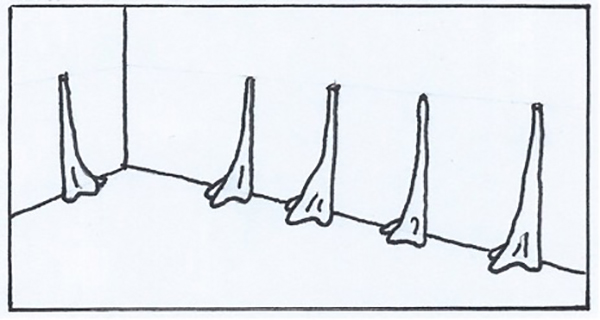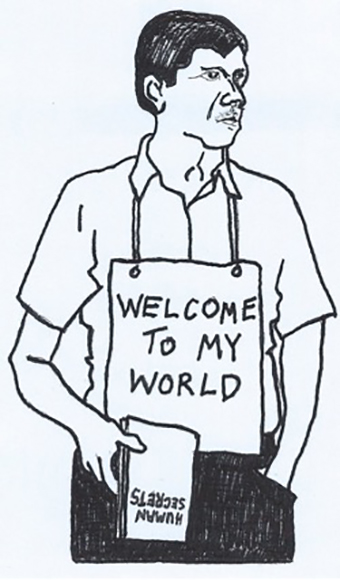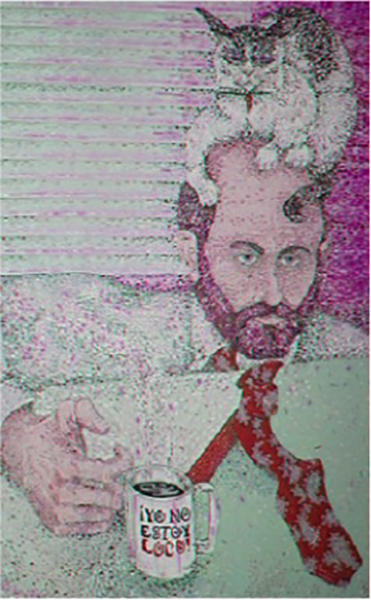I know Crad Kilodney is dead because I read the full-page obituary in Toronto’s Globe and Mail in August of 2014. It featured a picture of the famously obscure writer standing on a street corner with a sign hanging around his neck that read “Foul Pus from Dead Dogs.” The article described him as an eccentric and a misanthrope, but those words probably don’t do justice to his particular brand of anti-social literary weirdness.
The over-sized tribute in Canada’s national newspaper is one of the literary oddities illustrated by Kilodney’s career. He couldn’t get anyone to care about his little books when he was alive, but now that he’s gone, fans like me are realizing that his insight was more profound that it originally seemed. And if you’re a struggling writer, you see his ghost every time you look in the mirror.
Kilodney used to occupy a few square feet of sidewalk space at the intersection of Yonge and Bloor Streets, epicenter of the financial district, trying to convince young actuarial accountants to buy ill-tempered critiques of themselves with titles like “Bang Heads Here, Suffering Bastards” or “Lightning Struck my Dick.”
He was spectacularly unsuccessful, but his sheer persistence gave him an aura of respectability, as if he was the one principled man able to recognize the folly and hypocrisy of the business world and howl the inconvenient truth at office towers. Apparently, his financial survival was due to his success as a day trader, and I sometimes wonder if he considered that ironic payback or a pathetic capitulation.
My first encounter with Kilodney came when a friend retrieved one of his little autographed books and gave it to me. Someone had bought it, glanced inside then tossed it into a puddle. My friend thought I would be impressed with that provenance as much as the stories inside. The sign hanging around Kilodney’s neck that day was “Literature for Morons.” He regularly tried to bully customers into recognizing his genius and seemed genuinely puzzled when his clever marketing campaigns just alienated people.
Kilodney’s stories often use bodily waste in a symbolic way. His autobiography is called Excrement, for God’s sake, and suggests that a certain amount of self-loathing accompanies his disdain for others. Kilodney seems to embody the struggle typical of all writers: the intense desire to be loved and appreciated, coupled with the sad knowledge that most people simply aren’t worth the effort.
It seems natural for Kilodney to focus on the negative. In “Office Worker’s Dreams” an intern is directed upstairs to a washroom, but he only finds empty space with an obvious damp spot on the floor boards. Wracked with anxiety, the man finally unzips and goes to the bathroom, while his co-workers on the floor below start screaming. In another part of the same story employees are fired when their pens run out of ink, and the workplace angst is only ramped up by the complex systems of marking, swapping, and stealing pens.
Kilodney is really good at exposing the triviality of most human endeavors.
But there are times when a genuine concern for others manages to poke above the filth. In “Rainy Night,” the unnamed narrator, who reminds me a lot of Kilodney himself, looks at the people driving by him and admits that any one of them could be participating in a drama equal in intensity to what he is experiencing at the moment. Of course, he’s in the middle of lugging pickle jars of human waste out of his ex-girlfriend’s husband’s apartment, so it’s unlikely that their situations are exactly equal. But at least he recognizes that he doesn’t have a monopoly on personal despair.
In my favorite piece, “Cowboy Story,” Bob’s romantic, delusional life as a lawman in the old west is picked apart piece by piece, until he is forced to accept the banal reality of the suburbs. He wants beans and coffee for supper, but settles for pizza. He has to turn in his six-shooter as part of a police amnesty program. He has to get a job in a dog biscuit warehouse to help keep the old homestead going…. Cowboy Bob’s family seems loving and sympathetic while they gently nudge him away from his fantasy. The story is sad, but without villains.
Everyone has probably had the experience of life imitating literature in a sudden and unsettling way. Well, here’s my version. I once stumbled into a real-life Crad Kilodney story-situation… and briefly understood his anguished longing for meaningful connection.
I was a commercial painter with a list of vacant units that had to be refurbished within a couple of weeks. I entered a three bedroom semi and placed an armload of drop sheets and rollers on the linoleum floor. The place was emptied of furniture and there were some obvious repairs to a water-damaged ceiling, so I assumed it was all prepped for painting. But there was something odd in the living room.
A series of molded, plaster-like shapes were pressed against the walls, ringing the perimeter of the room. They had the appearance of fanciful miniature volcanoes with slightly irregular, lumpy bases and slender peaks. They were all exactly the same height (about 20 inches) as if their elevations had been scribed with a laser level. This is what they looked like:

I knelt down in front of one of the little constructions for a closer look. It had the same nicotine-beige color as the flat parts of the walls. It was slightly porous, like drywall compound that had been thickly applied.
I was utterly mystified.
Was this some form of structural repair that I was unfamiliar with? I tentatively poked at the mound with a screwdriver. The surface was as hard as cured grout and I could feel the solidity of its core.
I wanted to get a hammer and chisel from my tool box and transform the area into a familiar-looking room again. But there was something about the precision and regularity of the structures that made me hesitate. I felt insecure, and dreaded the possibility of destroying something that had been carefully installed, just because I was too dense to appreciate its significance.
I slowly stood up. I didn’t want to phone the property manager to ask about something that was (I suspected) childishly obvious.
Suddenly, a maintenance van pulled into the driveway beside my truck. Two men in coveralls got out. “Hi,” one of them said when they entered the unit. “We’ve got to chip that stuff off the living room walls before you start to paint.”
“I’ve been wondering,” I said nonchalantly, “what it was.”
One man opened a tool box and pulled out a broad, flexible, fine-toothed saw. “Crap,” he said.
“I beg your pardon?”
“Monkey excrement,” the man said as he gingerly worked the saw blade along the wall and encouraged it to bite into the tip of volcano number one. “The tenants here used to keep a monkey in a pedestal cage. The animal had the run of the house by day but at night it slept in a decorative, loose wicker box.” His implement made rasping noises as it quickly worked its way down towards the floor, creating two delicate piles of dust on each side of the lumpy mountain base.
The other maintenance man was eager to continue the story. “The monkey would press its butt against the wall every morning and go to the bathroom. When the pile touched the bottom of the cage, the tenants just moved it over eighteen inches and rebooted.”
I looked at the evenly spaced objects.
“When the room was completely ringed with sculptures of solid monkey crap…” the maintenance man paused dramatically “…they moved.” The first mound was pried off the floor and placed in a bag.
“Something new every day,” the second man said as he grabbed a sanding pole and buffed the wall clean. In an hour, no one would be able to tell that the apartment had once been inhabited by a group of people who were molding brand new definitions for the words “eccentric” and “misanthropic.”
I wanted to understand how someone could live in that environment, but I had trouble imagining the tenants as real people. Basic hygiene was probably the least of their problems. I wondered if they ever went next door for a coffee and asked the neighbors where their pies of monkey shit were kept. Based on the three-bedroom size of the unit, children had lived here. Did the kids ever say anything at school to indicate that their home-life was at all unusual?
I started calculating the duration of the tenancy based on approximate volume. I decided there was ample opportunity for social workers, girl guide cookie salespersons, political candidates or Mormons to randomly poke their heads past the front door and get a glimpse of the alternate reality within. Why hadn’t anything been done about it?
The maintenance guys were obviously aware of the odd back story, but it didn’t seem shocking to them. I didn’t know what was worse: imagining the vacant expressions of tenants who watched television surrounded by that ring of hardening banana puree, or seeing the smiling faces of the men who efficiently removed it.
I felt like I was in the presence of space aliens, intent on infiltrating the earth; they had perfected outward appearances but were still trying to understand complex behaviors. Here, they had screwed up by venerating bodily waste rather than being repulsed by it.
One of the maintenance men saw me struggling to speak, and put me out of my misery. “Here,” he said gently, holding out a ten-dollar bill. “Go get us all a coffee. When the cups are empty, all this…” he gestured expansively… “will be nothing more than a strange dream.”
Leaving the complex, I had to drive by a hundred living room windows, and I felt like the narrator of “Rainy Night” wondering what bizarre dramas were unfolding behind the drooping curtains and opaque, reflected squares of sky.
Near the donut shop, I saw the tightly smiling apparition of Crad Kilodney. There was a sign hanging around his neck that read “Human Secrets for sale. Cheap.”


Mark Thomas is a philosophy teacher and rowing coach in Beamsville Ontario (Canada). Prior to that, he had his own commercial painting business for ten years and was a member of Canada’s national rowing team. Thomas has had bits of writing published in The Globe and Mail newspapers; Blackheart, The Literary Hatchet, and Dark Gothic magazines; as well as on-line forums like 365 Tomorrows and CommuterLit.
5 Questions with Mark Thomas:
TD: Tell us a little about this story? Where did the idea come from?
MT: The inspiration for the piece of writing really was my personal experience as a commercial painter coupled with my love of Kilodney’s stories. When you deal with hundreds of subsidized rental units I think that you’re statistically bound to bump into some eccentric people. There have been many times when my work “reality” echoes (or surpasses) the weirdest literature.
TD: Who is your greatest influence?
MT: My greatest living writing influence might be Cormac McCarthy. (Seriously, the people I read are long dead. I like Umberto Eco a lot, but the selfish bastard died lately so he doesn’t count)
TD: Where is your favorite place to write?
MT: My favourite place to write is my living room couch with the laptop actually on my lap and a hockey game on T.V. (right now the Leafs are beating Tampa four– no five– to nothing).
TD: Favorite reading ritual?
MT: My favourite reading ritual is to lie in a bath and re-read shlocky genre novels (lately, I’ve been working my way backwards and forwards through all the Rex Stout detective stories).
TD: Favorite word?
MT: My favourite word is “actually,” because I always feel like I’m qualifying everything. Nothing in life or literature seems simple to me.



Cliff Burns
30 May
Lovely piece on an obscure literary figure, a true margin-dweller and voluntary exile from all things CanLit.
Coming across one of Crad’s publications in the 1980s gave me impetus to form my own imprint to release my work. I valued his reputation as the ultimate indie…as well as iconoclast, nay-sayer, unrepentant curmudgeon. An excellent role model for DIYers of all stripes.
Rest in peace, pal. This one’s for you, written after I found out you were gone:
https://cliffjburns.wordpress.com/2014/04/04/finity-new-poem